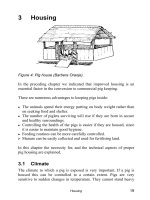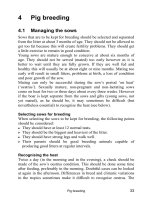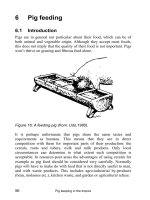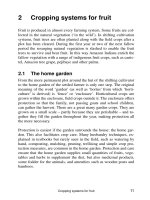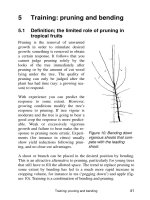Erosion control in the tropics - Part 9 ppsx
Bạn đang xem bản rút gọn của tài liệu. Xem và tải ngay bản đầy đủ của tài liệu tại đây (124.77 KB, 4 trang )
Conditions for the success of operations 75
9 Conditions for the success of
operations
Erosion control will have the best chance of success if the underlying
causes are removed. Unfortunately this is not always within reach of
the farmer concerned or the well-intentioned development worker ei-
ther. Sometimes the causes can only be tackled by political influence
among the people themselves, a process in which you, as a develop-
ment worker, can exert very little influence.
This does not mean that nothing can be done. It indicates the direction
we should look when deciding on measures to be taken, not only con-
sidering the effects the plan will have on the soil, but just as much, if
not more, the consequences for the people. However, often the lack of
technical know-how and information is not the most important hurdle
for controlling erosion. The fact that a certain requisite for the success
of an operation is not satisfied is more important.
A few of these will be mentioned. Obviously you must decide for
yourself the factors that should be taken into account in your area.
9.1 Trust
The first condition is that one is accepted by the inhabitants. A touch-
ing example of farmers accepting the advice for water conservation
measures comes from a village San Lucas in Peru. A man on a donkey
was allowed to travel through the area and talk to the people about
water conservation. The man made himself known as San Lucas. For
the people in the village this man was a living legend and they took
his suggestions to heart. The advantage of this was that the effects of
water conservation were soon noticed in the increased crop yields. The
demonstration effect should not be underestimated.
Erosion control in the tropics 76
9.2 Awareness
Only if people appreciate the usefulness of the operations to be carried
out, will they be inclined to take them up themselves. They should be
aware of exactly what is going on in their neighbourhood. Farmers are
often well aware of the drawbacks of their methods but carry on in the
same way because they don’t know any alternative.
So you, becoming involved, can give timely advice so that money,
time and effort and especially goodwill need not get lost. Together
with the local people, other ways can be looked for to achieve the ob-
jectives in a manner which is better adapted to the soil. In this way the
people will feel more responsible for the measures taken.
9.3 Correct choice of operations
When making a choice, take note of:
The order of priority
Erosion should be trickled at the source. A gully is the result of ero-
sion during and after a heavy storm. The additional water upstream
from the gully, which could not infiltrate into the soil flooded away
and led to gully formation. If only the gully is kept under control then
it will have just as much water and sediment to transport in the next
heavy shower. As long as nothing is done upstream the mud and water
flow will not change. Whereas gully control is not erosion control;
erosion control is the way to control gullies. Preventing large amounts
of water flowing into the gully is preferable to controlling the gully.
Prevention is always better than cure and in this case cheaper too.
The money at one’s disposal
Complicated operations are expensive and at first have very little re-
sult so the erosion authority is often considered to be an expensive
luxury. However, if by taking measures to control erosion you also
succeed in increasing yields (which is possible by water conservation
for example) then there will certainly be a criteria in planning the pri-
ority of measures to be taken.
Conditions for the success of operations 77
Associated with the costs is the risk for the farmer. The poorer soils
are often owned by the less affluent farmers. They are in no position to
take risks, so hardly invest in preventive measures whereas on these
soils the measures are most needed. Yet there are simple measures es-
pecially concerned with crop management that almost any farmer
could take without increasing the risks.
You could certainly point out erosion and its negative effects. But it is
doubtful if this is enough to motivate the farmers. We don’t want to
advocate short term thinking but sometimes it might be more effective
to motivate people through short term objectives.
The time available
If the harvest fails there is little left for the farmer but to try to keep
his head above water by working harder and longer. It should always
be remembered that the farmers’ family simply haven’t the time to
spend on erosion measures. The same applies to the problem of get-
ting firewood. If trees are gradually disappearing in an area, then peo-
ple will have to walk further and further to collect enough fuel. In Java
this may take up to 4 hours a day in labour cost. In the Himalayas
people sometimes have to work for 3 days to collect enough firewood
for a week.
So the time factor has to be taken into account when planning opera-
tions, in the first place to plan them at a time that is less busy for the
farmer. Secondly it must be taken into account that the soil may be
unfit for cultivation or the farmer may be working for his neighbour
or the landlord. The farmer will then be less inclined to put effort into
something for which he or she will not directly benefit.
Maintenance
Numerous examples can be given of projects which have failed simply
because of bad management. Many operations are pointless if they are
neglected. Since the inhabitants will have to carry on the works and
maintain them, it is essential that they see their benefit and feel re-
sponsible for them too. The people should feel that the project belongs
Erosion control in the tropics 78
to them. For this reason too, the local population should be involved in
the preparation and the execution of plans. After all, this is the land
that is to provide their subsistence. They are more likely to keep a
drain clean that they have dug themselves. Yet, we have also noticed
that the live barriers have not always been planted or maintained, be-
cause in spite of the encouragement from the advisory service, the
farmer was unable to do anything about it.

